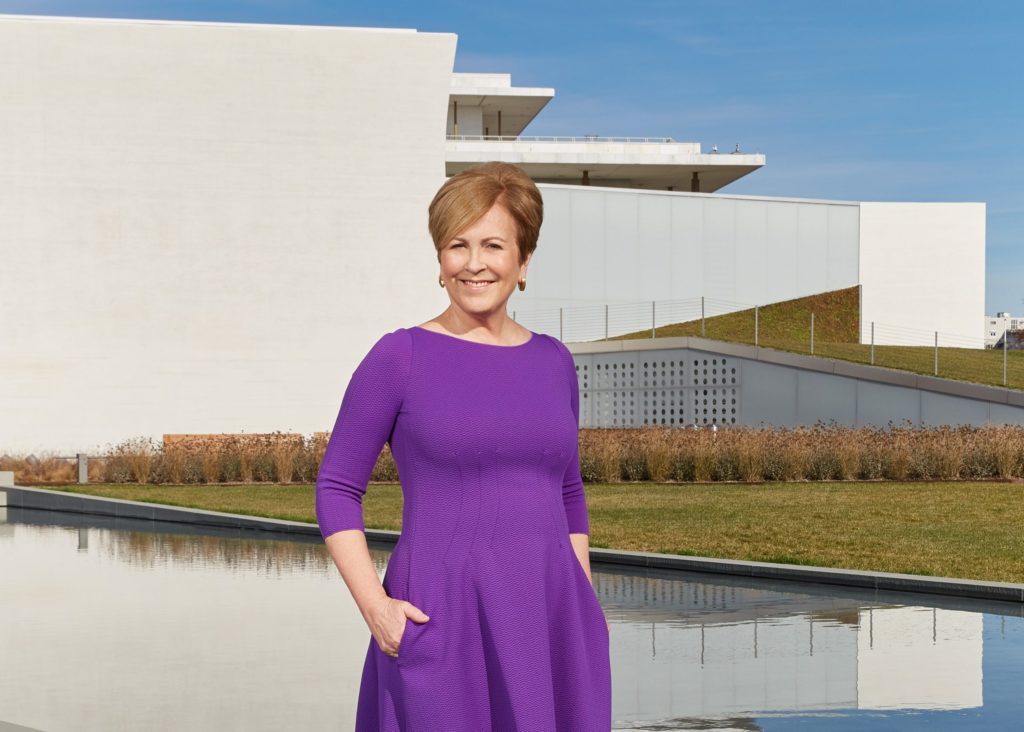Women Leaders: Deborah Rutter, President, Kennedy Center
By • April 14, 2022 0 1925

Our spring arts preview featured 20 women cultural leaders in Washington, D.C. We wanted to amplify their voices in our online newsletters, spotlighting each of them individually. Our Thursday April 14 newsletter features Deborah Rutter, president, The Kennedy Center.
THE GEORGETOWNER: D.C. should have a “spring awakening” of sorts after two long years of Covid. What are you most looking forward to for your institution this season?
DEBORAH RUTTER: What a difficult question for me to answer, as there is so much happening this spring! The joy of artists and audiences once again being in the same room to experience the live performing arts has been palpable throughout the Center this year, particularly as we celebrate our 50th Anniversary. Some of the upcoming programs I’m most looking forward to are tied directly to that celebration of our first half-century. In March we premiere “Written in Stone,” four world premiere works from the Washington National Opera inspired by Washington, D.C.’s iconic monuments. Later that month, the National Symphony Orchestra, Washington National Opera, and our Social Impact team launch “The Cartography Project,” a multi-year commissioning project that engages artists from around the nation to map Black dignity as a cultural response to extrajudicial violence. In April and May, young people and their families will be treated to two world premiere theatrical adaptations of stories by our brilliant Education Artist-in-Residence and MacArthur Genius Grant awardee, Jacqueline Woodson.
GEORGETOWNER: What led you to become a leader in your organization? Tell us a bit about your career trajectory and inspirations along the way.
DR: I’ve always been motivated by the power of the arts to change lives, create community and speak to the importance of recognizing and appreciating all people and all interests…. My good friend, Yo-Yo Ma and I developed the concept of Citizen Artist many years ago — the concept of all people connected to the arts using their talents to work towards something bigger than themselves and contributing to society…. My role at The Kennedy Center is a performing arts administrator’s dream: all of the arts “under one roof” and truly making the world a better place.
GEORGETOWNER: What are the biggest challenges for your organization?
DR: The pandemic caused significant financial challenges for the Kennedy Center, as we had 18 months of no ticket sales, and we normally rely on that earned income for approximately 70 percent of our budget. I’m incredibly grateful for the generosity of our donors and the federal funding that was so crucial in getting us through the last two years, but we still face a significant deficit. The real challenge for me is to meet these financial issues head-on while delivering on our Congressionally mandated mission as the National Cultural Center, living memorial to John F. Kennedy, and hub for arts education that serves more than 1.5 million students across the country each year.
GEORGETOWNER: How do you feel being among the first women to lead an arts institution?
DR: Women have been a driving force behind the non-profit arts for a long time. At the Kennedy Center alone, we make up nearly 70 percent of the administrative staff. I have been leading arts institutions since 1986, and in that time there has certainly been a change in arts leadership. However, there is still much work to be done, particularly in recognizing the work of women of color within our industry.
GEORGETOWNER: What are you most proud of accomplishing while serving in your position?
DR: This has been a period of great change. Just before the pandemic, in September 2019 we opened the REACH, the first-ever expansion of the Kennedy Center with flexible spaces that open up new possibilities for innovative artistic work and community engagement. I am also deeply proud of the work we’ve been doing to ensure that as the nation’s center for the performing arts we are truly representing the nation with the inclusion of Hip Hop Culture and Comedy as core programmatic areas, while we embed Social Impact initiatives throughout the Kennedy Center, National Symphony Orchestra, and Washington National Opera, sparking critical conversations around race and discrimination.
More information on The Kennedy Center can be found here.

